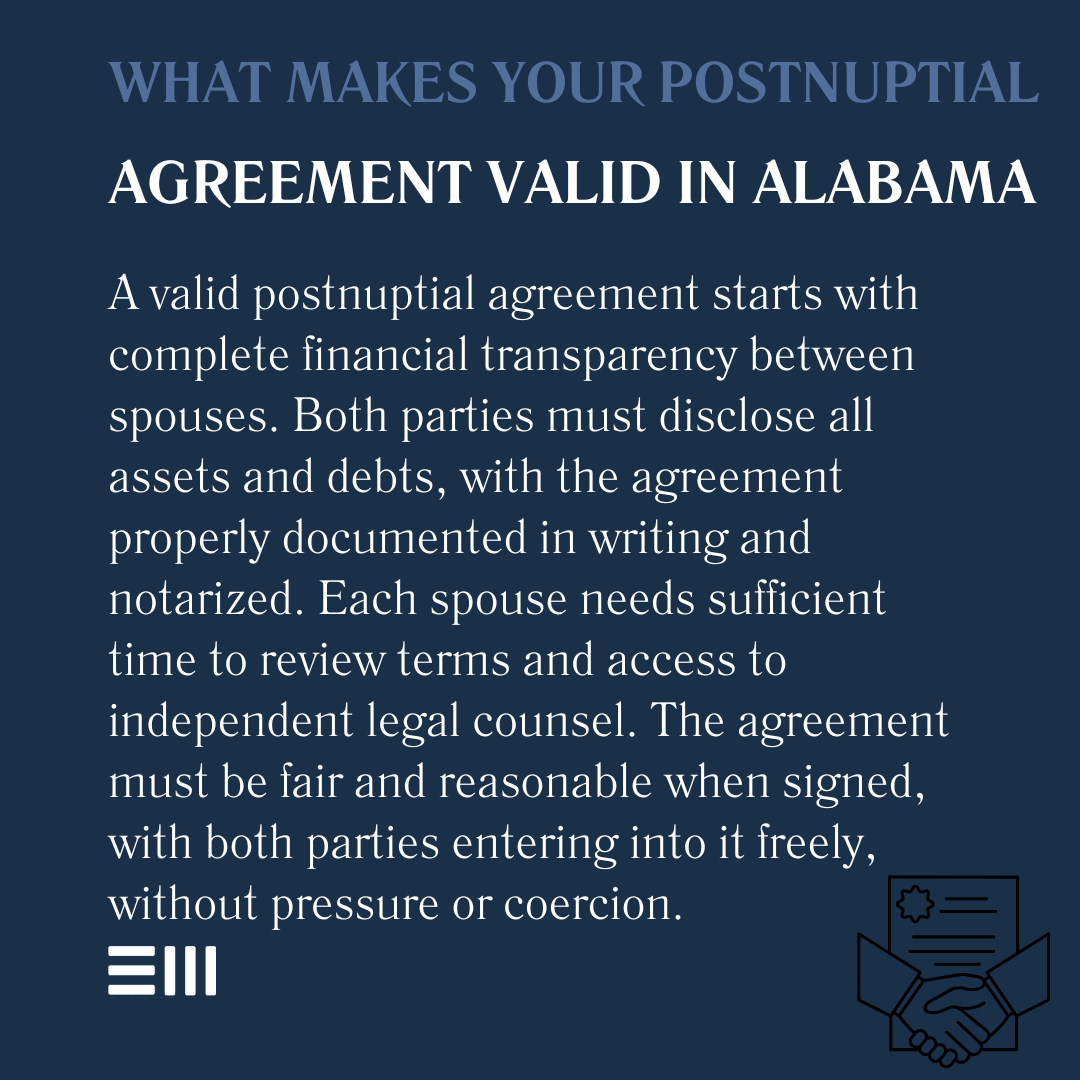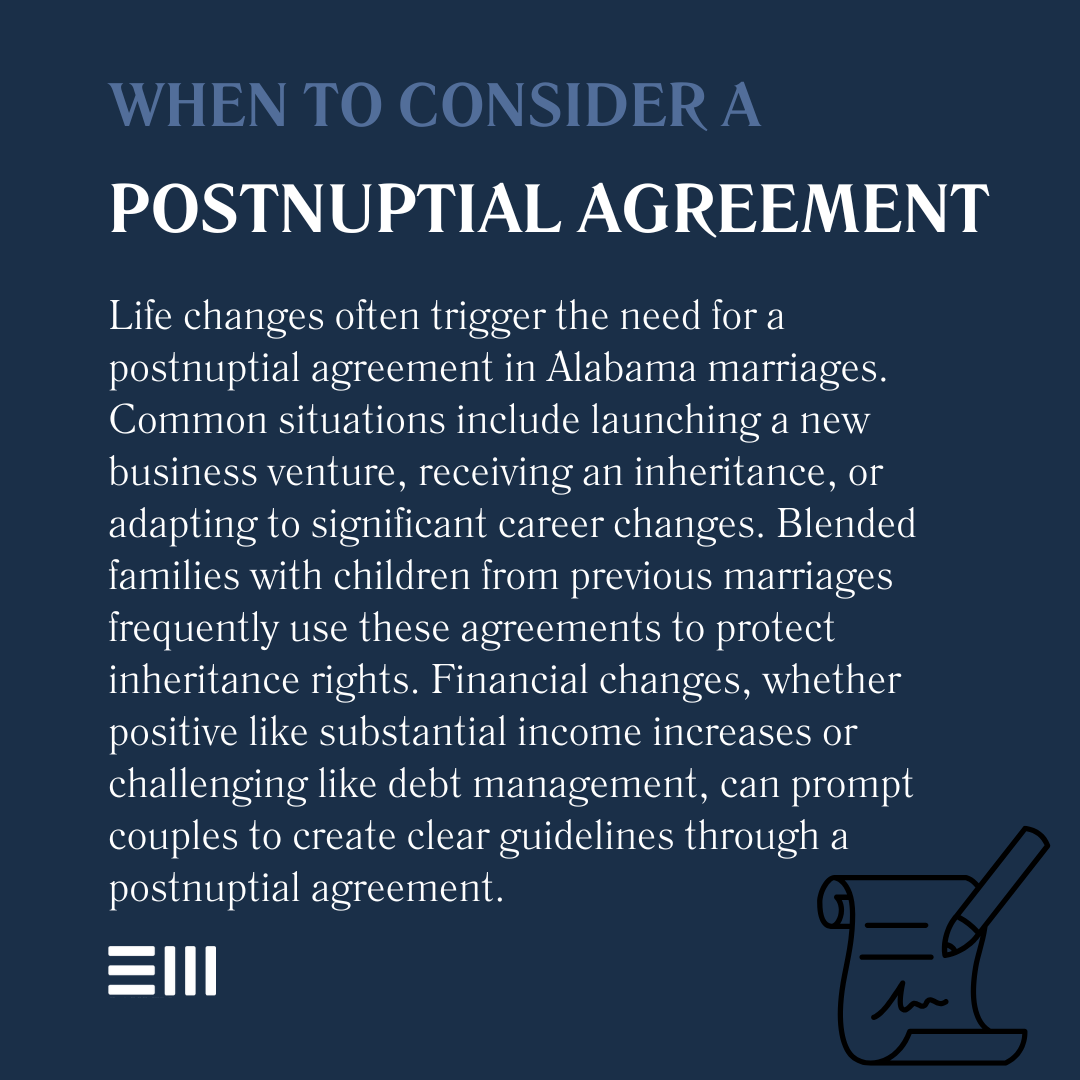Behind every successful marriage lies open communication about finances, shared goals, and future plans.
While some couples have these conversations before marriage, others find clarity in their financial journey after exchanging vows.
For Alabama couples, postnuptial agreements offer a structured way to document these important discussions, protect individual assets, and create a roadmap for their financial future together.
These legal documents serve as more than just financial contracts—they often strengthen marriages by eliminating uncertainty and fostering honest dialogue about money, property, and shared responsibilities.
Understanding Postnuptial Agreements
Marriage brings together not just two people but their assets, debts, and financial obligations.
A postnuptial agreement in Alabama allows married couples to clearly define property rights, financial responsibilities, and asset distribution, providing security and clarity for both parties.
These agreements have become increasingly important as couples face more complex financial situations and blended family dynamics.
What Makes a Postnuptial Agreement Valid in Alabama
Alabama courts recognize postnuptial agreements when they meet specific requirements.
Understanding these elements helps ensure your agreement withstands legal scrutiny and provides the protection you seek.
- Both parties must provide complete financial disclosure, including all assets, debts, and income sources, with detailed documentation and current valuations;
- The agreement must be in writing and signed by both spouses in the presence of a notary, following Alabama's strict execution requirements;
- Each spouse should have adequate time to review the agreement before signing, typically recommended as at least seven days;
- Neither party should be under duress or coercion when signing, with clear documentation of voluntary participation;
- The terms must be fair and reasonable at the time of execution, considering both parties' circumstances;
- Both spouses should have the opportunity to seek independent legal counsel before signing;
- The agreement should include clear language about each party's rights and obligations;
- Financial disclosures should be attached as exhibits to the agreement; and
- The document should clearly state that both parties understand its contents and implications.
A properly executed postnuptial agreement demonstrates transparency and mutual understanding between spouses while providing legal protection for both parties.
Benefits of Creating a Postnuptial Agreement
Postnuptial agreements offer numerous advantages for Alabama couples seeking financial clarity and security in their marriage.
These benefits extend beyond basic asset protection to enhance overall marital stability.
- Protection of individual business interests and investments from potential division in divorce;
- Clear designation of separate property acquired before marriage;
- Established guidelines for handling future inheritances or gifts;
- Defined responsibilities for existing and future debts;
- Protection of children's inheritance rights from previous marriages;
- Outlined spousal support terms in case of divorce;
- Preservation of family businesses and generational wealth;
- Clear protocol for handling retirement accounts and pensions;
- Protection of intellectual property rights and future earnings;
- Framework for managing joint investments and property acquisitions;
- Guidelines for handling future windfalls or unexpected assets;
- Protection of family heirlooms and sentimental property;
- Clear designation of responsibility for marital debts and obligations; and
- Established procedures for handling joint business ventures.
These benefits create a foundation for open financial communication and future planning in marriage while providing security for both parties.
Alabama-Specific Legal Considerations
Understanding Alabama's unique legal framework for postnuptial agreements helps ensure your agreement's validity and effectiveness.
Property Division Laws in Alabama
Alabama follows equitable distribution principles when dividing marital property.
Without a postnuptial agreement, courts consider various factors:
- Length of the marriage;
- Each spouse's economic circumstances;
- Contributions to the marriage;
- Custody arrangements for minor children;
- Tax consequences of property division;
- Each spouse's earning capacity;
- Conduct of the parties during marriage;
- Health and age of each spouse; and
- Future financial prospects.
A postnuptial agreement can override these default rules with specific terms agreed upon by both parties.
Common Situations for Postnuptial Agreements
Every marriage has unique circumstances that might warrant a postnuptial agreement.
Here are situations where Alabama couples commonly seek these agreements:
- One spouse starts a business after marriage;
- Significant inheritance or gift received during marriage;
- Career changes affecting financial dynamics;
- Blended families with children from previous marriages;
- Changes in financial circumstances;
- Recovery from financial infidelity;
- Estate planning modifications;
- Reconciliation after separation;
- Protection of family business interests;
- Significant increase in one spouse's income;
- Receipt of substantial gifts or inheritances;
- Major investment opportunities;
- Debt management concerns; and
- Changes in retirement planning.
Understanding these situations helps couples recognize when a postnuptial agreement might benefit their marriage and provide necessary protection.
Essential Elements to Include
A well-drafted postnuptial agreement should address:
- Property division methodology;
- Debt allocation procedures;
- Spousal support provisions;
- Estate planning considerations;
- Business ownership rights;
- Investment management;
- Real estate holdings;
- Retirement accounts;
- Insurance policies;
- Tax obligations;
- Future inheritance rights;
- Asset management procedures;
- Dispute resolution methods; and
- Amendment procedures.
Each of these elements plays a vital role in creating a comprehensive agreement that stands the test of time and provides the protection both parties seek.
Common Mistakes to Avoid
Being aware of potential pitfalls helps ensure your agreement's validity:
- Incomplete financial disclosure;
- Rushed execution;
- Unequal bargaining power;
- Ambiguous language;
- Unfair provisions;
- Improper execution;
- Lack of independent counsel;
- Emotional decision-making;
- Overlooking future assets; and
- Inadequate documentation.
Avoiding these common mistakes while drafting your postnuptial agreement helps ensure its enforceability and effectiveness in protecting both parties' interests.
Regular Review Process
Implement these practices to ensure your agreement remains current:
- Annual financial disclosure updates;
- Regular legal compliance checks;
- Documentation of any changes;
- Review of asset valuations;
- Update of financial objectives;
- Assessment of changing needs;
- Verification of insurance coverage;
- Review of estate planning alignment;
- Evaluation of tax implications; and
- Update of beneficiary designations.
Regular attention to these review processes helps maintain your agreement's relevance and effectiveness throughout your marriage, ensuring it continues to serve its intended purpose as your circumstances evolve.
Frequently Asked Questions About Postnuptial Agreements in Alabama
Alabama couples often have specific questions about postnuptial agreements.
Here are answers to common inquiries about these important legal documents.
How Do Postnuptial Agreements Differ From Prenuptial Agreements?
The primary distinction lies in timing. While prenuptial agreements occur before marriage, postnuptial agreements take place after the wedding. Both serve similar purposes but may face different levels of scrutiny in Alabama courts.
Can a Postnuptial Agreement Be Modified?
Yes, spouses can modify their postnuptial agreement if both parties agree to the changes. Any modifications must follow the same legal requirements as the original agreement.
What Happens if One Spouse Refuses to Sign?
Postnuptial agreements require voluntary participation from both spouses. If one spouse refuses to sign, the agreement cannot be enforced, and married couples must rely on Alabama's marital property laws.
Take the Next Step to Protect Your Future
Creating a postnuptial agreement requires careful consideration and legal expertise. Our experienced family law attorneys understand Alabama's specific requirements and can help craft an agreement that protects your interests while strengthening your marriage.
Contact us today for a confidential consultation about your postnuptial agreement needs. Our team will guide you through each step, ensuring your agreement provides the security and clarity you seek for your financial future.
Let us help you create a comprehensive postnuptial agreement that stands the test of time and protects what matters most to you.


